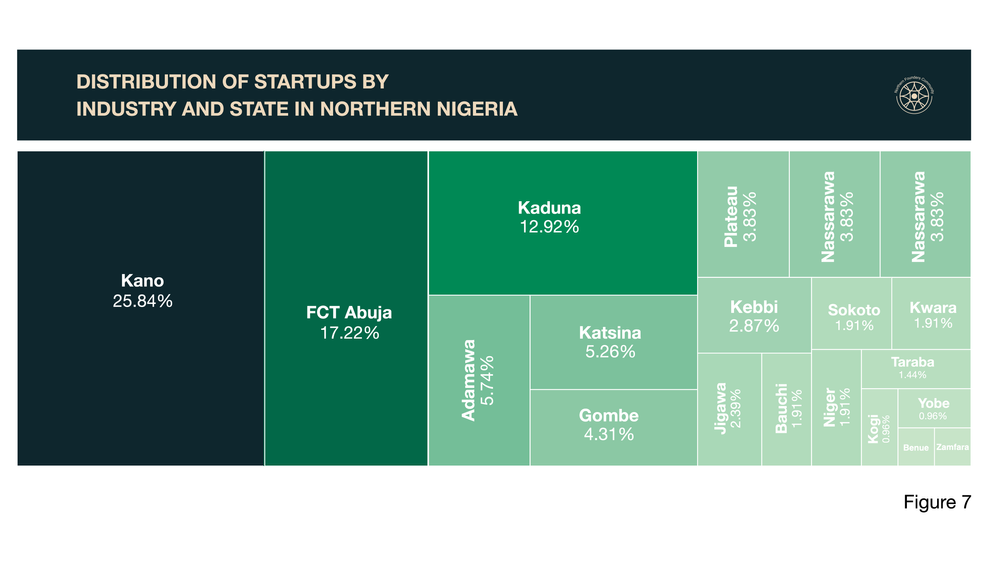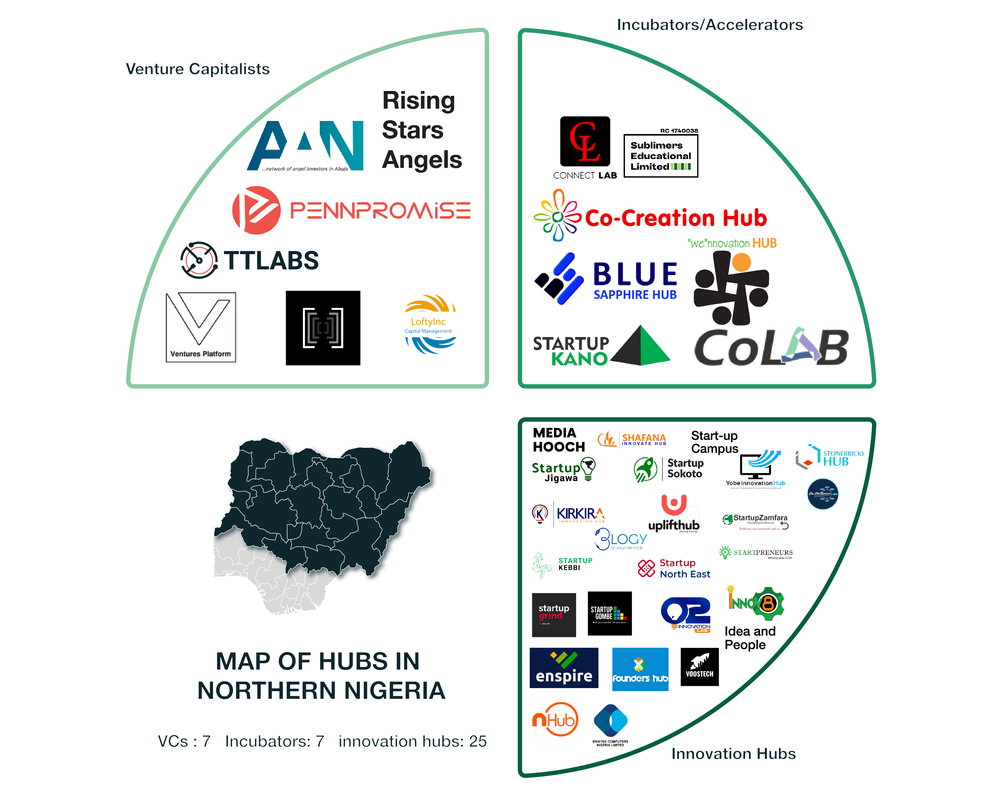More than half of Northern Nigeria’s startups can be found in Kano, Kaduna, and Abuja, Nigeria’s Federal Capital Territory (FCT), according to the 2023 Northern Nigeria Tech Ecosystem by TechTankLabs (TTLabs), a venture capital firm focused on the region.
Kano leads the way with a 25% share, followed by Abuja at 17.22%, and Kaduna at 12.92%, with Adamawa (5.74%), Katsina (5.26%), Gombe (4.31%), and Plateau (3.83%) trailing behind in the distribution of startups within the region.

TTLabs indicated that it reached its conclusion based on an analysis of 188 startups. Among these startups, 50% are established by young adults, and over half of the founders in the region hold university degrees.
The report highlights that a majority of startups in the region are primarily engaged in offering software development-related services, with others active in agritech, edtech, fintech, and e-commerce sectors. Interestingly, the report reveals that during the review period, edtech and agritech startups emerged as the top revenue generators, each recording approximately ₦1 billion in earnings.
It is important to note that most of these startups are bootstrapping. While others have been able to raise funding. For instance, Abuja-based fintech startup, Sudo Africa raised $3.7 million pre-seed to build its card-issuing API for developers and businesses in Nigeria. Another startup, Shap Shap won $8000 at the Gulf Information Technology Exhibition during GITEX in 2022.
Consistent with our previous reporting on Northern Nigeria’s tech ecosystem, the report also underscores that the growth of startups in the region has been hindered by challenges such as inadequate funding, a shortage of skilled workforce, political instability, limited business networks, and insufficient infrastructure.
According to Iyin Aboyeji, founding partner of Future Africa, “One of the primary challenges hindering growth in the Northern tech ecosystem is the lack of adequately trained hubs and incubators. These institutions are crucial for nurturing startups, but many in the North lack the capacity to effectively transfer skills. This deficit is not just about the number of accelerators or incubators; it is about their quality and effectiveness.”
“The tech ecosystem in the North is still at a growing phase. However, it lacks a strong sense of community and venture capital funding,” Johnpaul Nwobodo, an associate at Proximity Ventures, told Bendada.com.
Sanusi Ismalia, the founder and CEO of Kaduna-based innovation hub, CoLab, also echoes the aforementioned thoughts: “Other hindrances include a lack of funding and investment in ancillary services that are essential for growing the ecosystem, such as business skills development and legal support.”

Ongoing efforts to break barriers
Last year, Ismalia, in collaboration with Aboyeji’s Talent City (now Itana) and the Kaduna state government launched the Kaduna Technology City to create an enabling environment for tech talents and entrepreneurs in the state, and the rest of the North.
“It’s really a city that will attract tech talents and entrepreneurs, not just a co-working space,” Ismaila told Bendada.com over a call in June 2022. “In a way, we are looking ahead and actively building the kind of city that the talent we are already creating today will live in because we need these smart people to aggregate. That’s when the magic happens, people start building the unicorns of tomorrow when they aggregate.”
In August, the Kaduna state government domesticated the Nigeria Startup Act, resulting in the introduction of three startup grants and investment funds tailored for startups within the state, as reported by Nasir Dambatta, a media aide to Governor Uba Sani.
Earlier this year, Surayyah Ahmad, founding partner at TechTankLabs, in an article said that: “Many investors are based in Lagos and are more likely to invest in startups based in the southern part of the country. This bias has made it difficult for startups in the North to secure funding, even if they have promising ideas and strong teams.”
In a move to gradually break this bias, Surayyah’s TechTankLabs on Wednesday announced the inaugural cohort of the Northern Founders’ Startup Accelerator Program. The selected startups include; Spendo, Nearpays, Agriache, Stylebitt and Kamel, each of which will receive an undisclosed cheque at the end of the programme.
Surayyah, who also co-founded Northern Founders’ Community, told thecondia.com that an ongoing collaborative effort to start a $10 million direct investment fund in the region. “This will be announced before the year runs out,” she said.
A few months ago, during a private meeting observed by Bendada.com, tech operators in Plateau state mulled the relaunch of Jos Angel Network (JAN), a coalition that was launched by nHub, Northern Nigeria’s first innovation hub, in 2019. “Although it was going to be a game changer when we launched, the network was not the right time,” Theodore Longji, CEO of nHub told Bendada.com.
When it was launched, JAN wrote three cheques to Jos-based startups operating in fintech and agritech. Longji expressed his optimism about the network’s potential revival and the growth of the tech ecosystem.
Related Article: Northern Nigeria tech entrepreneurs want to revamp the startup ecosystem
Get passive updates on African tech & startups
View and choose the stories to interact with on our WhatsApp Channel
ExploreLast updated: January 1, 2025





